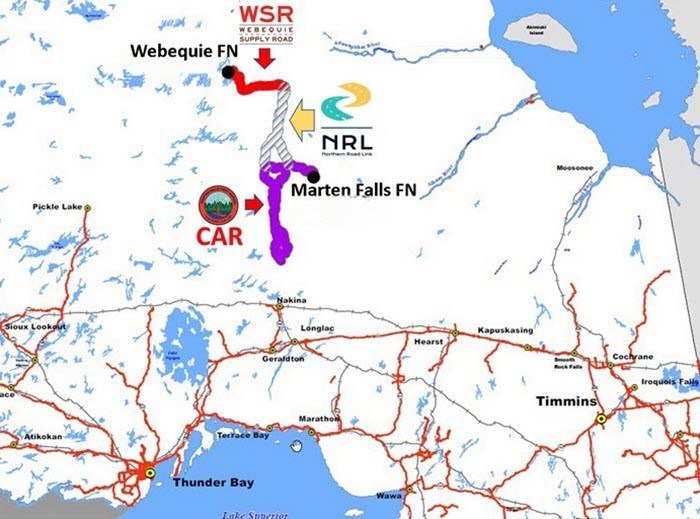
News
Roads & Paving
Ontario has ‘weaponized’ environmental assessment on Northern Road Link: Neskantaga First Nation
May 11, 2021 By Rock to Road Staff
 Project Location Study Area (CNW Group/Webequie First Nation and Marten Falls First Nation)
Project Location Study Area (CNW Group/Webequie First Nation and Marten Falls First Nation) The Neskantaga First Nation is raising alarm bells about the environmental assessment that is set to start on the Northern Road Link (NRL).
The NRL is a proposal to build a 120-kilometre long north-south road in a remote part of Ontario, north of Thunder Bay. It would connect two other proposed road development projects — the Webequie Supply Road (WSR) and the Marten Falls Community Access Road (MFCAR).
It will provide access to the Ring of Fire mining development area as well as the provincial highway system.
In a letter dated May 10 to Jeff Yurek, Ontario’s Minister of Environment, Conservation and Parks, Chief Wayne Moonias of the Neskantaga First Nation expressed concern about the process.
“It is obvious that Ontario has ‘weaponized’ the environmental assessment process to further repress our Aboriginal and Treaty rights,” said Moonias.
“We are under duress.”
Triple threat
The community is facing what he called a triple threat – from the pandemic, the ongoing water crisis and the continued marginalization of their voices in the environmental assessment of proposed roads into Ontario’s Ring of Fire.
“We reject that an environmental assessment of a mining road should be treated like an essential service during a pandemic,” he said, adding the province is weakening already-limited measures which do exist to address meaningful participation by Indigenous communities in environmental assessment.
Calls for a pause
Moonias said the Neskantaga First Nation has repeatedly asked for a pause in the environmental assessment process for the MFCAR. The COVID-19 pandemic has limited their ability to practice Anishinaabe governance mechanisms, he said.
“Elders who hold important and necessary knowledge about community protocols, local ecology and cultural sites have been unable to contribute to community discussions because of their particular vulnerability to COVID-19,” said Moonias. “With the rise of variants during this third wave of the pandemic, public health guidance continues to advise First Nations leaders to maintain strict restrictions within our communities, meaning that trips should only be for essential medical services.”
Normally, they would gather with off-reserve members in Thunder Bay, Ont., to hold discussions – something currently impossible, he said.
Until conditions change substantially, he said, the community could not react to the proposed Northern Road Link.
“We can’t imagine a worse time for an environmental assessment,” said Moonias. “Simply put, this is the wrong process at the wrong time. We should not be expected to make these important decisions under duress. We have to preserve our community until this disease is over, because it is dangerous. We demand that Ontario pause all environmental assessment processes in the Ring of Fire until the pandemic is over.”
Additional concerns
Beyond limitations due to the global pandemic, Moonias listed additional issues that Neskantaga First Nation has with the process.
The Terms of Reference for MFCAR are “unlawful,” he said, because they adopt a narrow scope which amounts to “project splitting.”
“Ontario’s plan to develop the Ring of Fire is based on a north-south all-season road corridor to provide access,” he said. The concern is that the province is intentionally breaking the project up into its component parts “in order to avoid genuinely considering all of this expected environmental, social and economic impacts at the appropriate scale.”
Print this page